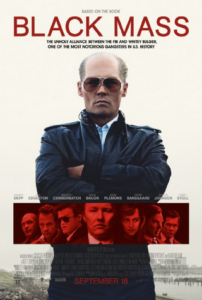
 “How could you be so cold?” James “Whitey” Bulger asks the mother of his child as they sit together in the cafeteria of a Boston hospital. It’s the mid to late 1970s, and upstairs their young boy lives only with the assistance of tubes and machines.
“How could you be so cold?” James “Whitey” Bulger asks the mother of his child as they sit together in the cafeteria of a Boston hospital. It’s the mid to late 1970s, and upstairs their young boy lives only with the assistance of tubes and machines.
That statement pretty much sums up “Black Mass,” a well-acted and produced film that is so cold that viewers might reach for a blanket. It’s and interesting failure that has its origin in the question that the producers had to ask prior to going into production: What story do we tell?
Instead of focusing their efforts on a particular event that defined their subject or conveyed a profound message, Director Scott Cooper (“Crazy Heart”) working from a screenplay by Mark Mallouk and Jez Butterworth travels through two, possibly three decades of Bulger’s criminal life. We follow the rise of Whitey (Johnny Depp) and an FBI agent John Connolly (Joel Edgerton) as they become linked for selfish reasons. Neither man appears charismatic with Connolly coming off as a bit of dull blade. Both grew up in South Boston and Connolly hints that they have a history together. Something is mentioned that Whitey helped Connolly out in a fight as a child, but this is never explicitly shown to us. And keeping their bond vague proves to be frustrating.
What is more interesting is Whitey’s relationship with his younger brother Billy (Benedict Cumberbatch), who is the president of the Massachusetts state senate. Billy is a rising political star who turns a blind eye to his brother’s wrong-doing. Eventually, this willful ignorance will take down Billy, but that story is left for another movie.
Whitey’s ascent to crime boss is told at a reserved distance. We meet Whitey as though we are sitting across the room and observing him or worse, reading a non-fiction account about his exploits. There’s very little context of the time or Whitey’s place in it.
We get talk about vending or gaming machines, and there are scenes involving beat-downs and obvious extortion and protection rackets. At one point, we even see a newspaper headline that has Whitey taking part in a $14 million lottery jackpot. But these are glimpses that pass too quickly to be fully absorbed. And by the time we get to Whitey’s murderous involvement with World Jai Alai, viewers may be reaching information overload.
Much has been said in the media about Depp’s return to serious dramatic acting. And here, first and foremost, his heavy makeup is impressive but very hard to dismiss. The performance, which is more than mimicry, is strong but whether it’s make-up job or the character’s personality that holds him back is hard to determine. We never get inside James “Whitey” Bulger, and the lack of intimacy is pervasive throughout the film.
Joel Edgerton, also, looks the part, but his handling of Connolly is odd. He never seems to make eye-contact with anyone. And his dialogue is so basic that the character comes off as not credible, a simpleton, who could never construct the masterful scheme that permits Whitey to become an Irish mob kingpin. The FBI looks like a bunch of macho dimwits lacking in basic detective and investigative skills. Perhaps Edgerton is miscast here—we know he can connect with audiences, but here that connection is missing.
But the biggest miss in “Black Mass” is that it isn’t entertaining. Compare Martin Scorsese’s Oscar winning and irresistibly sweeping “The Departed” that also deals with a South Boston Irish gang (a fictional one, likely based in part on Bulger’s Winter Hill Gang). Without glorifying the criminal lifestyle, “The Departed” manages to weave a massively entertaining story containing a few significant colorful characters with, at least, some redeeming and entertaining qualities. And Scorsese managed to bring things to a somewhat familiar but meaningful conclusion.
By contrast “Black Mass” is positively morose and even joyless as Whitey kills and threatens his way up. Why anyone followed him is a nagging question. Sure, if you didn’t fall in line, you’d end up buried under a bridge, but even criminal leadership requires some level of charisma. Nothing in “Black Mass” suggests that Whitey had any likable qualities even among his criminal cohorts. He lives a spartan lifestyle, and keeps everyone at a distance. If this is how the man really was, that is perfectly fine, but the movie should probably have found its focus elsewhere. And by trying to tell such a broad story, “Black Mass” really has no conclusion. Whitney Bulger was captured after being on the lam for some 12 years. It’s all somewhat anti-climatic.
Filmmakers who make movies about crime bosses have to be careful not to fall in love with their subjects. But in trying to fairly and accurately tell the true story of a criminal, a filmmaker has to be equally careful to remember that he or she is working within the narrative cinematic form. And that means that many of the arguably boring details could be left to the documentary format. “Black Mass” fails to make maximum use of cinematic story-telling techniques that translate the central theme and message to the viewer. And with this much potential that might be some kind of crime.
